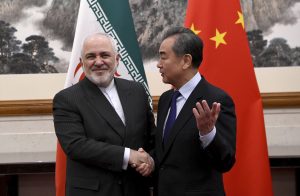As the United States slapped additional sanctions on Iran on October 8, the Islamic Republic faces a grim financial future. The Iranian economy is already struggling, and the new designations would almost completely sever the country’s access to global capital. As U.S.-Iran relations deteriorate by the day, Iran has increasing economic and political motivation to lean into its strategic partnership with China.
Iran’s economic motivations loom large given the dire circumstances. Since 2018, the United States has launched an aggressive pressure campaign on Iran. The most recent sanctions put a nail in the coffin, as they bring the remaining 18 Iranian banks that were not subject to secondary sanctions under this more aggressive pressure. Though Iran was already largely cut off from the international financial system for most trade, this in effect now completely severs Iran’s access to the U.S. dollar and basic consumer goods. While the sanctions carved out an exception for humanitarian transactions, international financial institutions such as those in Europe and developed Asia will also be hesitant to touch these transactions for fear of sanctions. Also, as Iran’s reserves dry up, the Central Bank of Iran will be even less able to defend the rial. On top of the country’s currency crisis, which is adding to inflationary pressures, economic vulnerabilities such as a rising current account deficit (including a large trade deficit with China) and fiscal deficit exert additional pressure on its already dwindling currency reserves.
China has been willing to flout U.S. sanctions on Iran in the past, as it continues to buy oil and engages in other financial dealings. China’s willingness to support trade and offer critical investments now presents an economic lifeline to Iran.
For Iran, there is also a political motivation in building closer ties with China. Iran’s hardliners and reformists both prefer China over the United States. The hardliners have always been skeptical if not outright hostile to the West, while the pragmatists and reformists, disillusioned after the U.S. withdrawal from the Joint Comprehensive Plan of Action (JCPOA), have no viable option other than accepting China as a strategic partner.
But Iran’s interest in tightening ties with China may not go both ways. On paper, Beijing has been a willing partner, as it recently drafted a $400 billion economic and security deal with Iran that promises sprawling infrastructure investments over the next 25 years (although the promised number may be overstated). It officially reduced its energy imports from Iran in the past few years, but has been receiving secret shipments. Moreover, the Bank of Kunlun, China’s hand-picked bank handling payments between Chinese and Iranian entities with no correspondent relationships in the United States, continues to process transactions between Chinese and Iranian parties.
Nevertheless, a better relationship with Iran opens up economic and political concerns for Chinese policymakers. Economically, China may be reluctant to accrue more liability when it contemplates extending more credit to Iran and many of its regional neighbors. This reluctance to increase outlay is compounded by the COVID-19 pandemic, as China had to renegotiate 40 bilateral debt arrangements already (and more are coming). Understandably, China may not be optimistic about Iran’s ability to honor its obligations in these challenging times.
Politically, teaming up with Tehran may anger its strategic partners in the region. Saudi Arabia is a particular partner of concern, as China relies on Saudi barrels to make up for the shortfall in Iranian energy imports. Israel would most definitely also protest if China explicitly helps Iran back on its feet. China wants to maintain a diverse supply of oil and avoid over-reliance on any one trading partner. It also needs to protect its business interests in the region, such as its joint ventures with Iranian firms. With all these concerns in mind, China will have to manage its relationship with these states gingerly, or risk endangering its expansive investments and trading relationships in the region.
China’s ideal strategy with Iran and the region would be safeguarding Chinese interests – diverse energy supplies, trade supply lanes, and export markets, to name a few – without taking on more economic and political liabilities. However, due to financial and diplomatic entanglements, China likely cannot avoid the downsides of its activity in the region. Beijing will need to manage Iran’s frequent obstruction in the Strait of Hormuz, stomach the possibility of Iranian debt delinquency, and balance regional volatility from actors such as Saudi Arabia and Russia that may threaten its energy security and investments.
The Chinese Communist Party’s fifth plenary session in late October may clue us in on how Beijing would engage Tehran. Combined with the release of the 14th Five Year Plan, this plenum will lay out the guiding principles of China’s economic development from 2021 to 2025. There will likely be more details on the “dual circulation” strategy, where China is attempting to reap the benefits of both economic integration and self-sufficiency. As Iran becomes more important to China’s economic ambition, we could potentially discern China’s approach to Iran from these official documents. However, Beijing is unlikely to make bold moves before November 3. As U.S. Iran policy may change after the U.S. presidential election, China may want to hedge its bets and not move too quickly beyond what it has already done with Iran. Even if Beijing is to extend a lifeline to Tehran, it will do so with caution, as it is burdened by ample economic and political vulnerabilities.
Emily Jin is a research assistant in the Energy, Economics, and Security Program at the Center for a New American Security (CNAS).

































